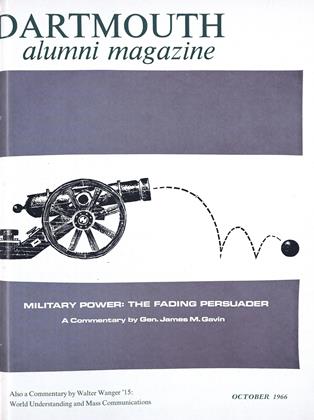By PhilipBooth '47. New York: The Viking Press,1966. 65 pp. $4.50.
These are fine poems - finely controlled, finely disciplined, finely realized. While reading them, I thought of a statement Thoreau once made. "A sentence," he said, "should read as if its author, had he held a plough instead of a pen, could have drawn a furrough deep and straight to the end." Philip Booth could, I think, draw the kind of furrough that would have pleased Henry Thoreau.
Especially remarkable is the quiet and determined power of these poems. Booth holds his reader with the force of his essential honesty. He insists always on seeing the thing as it really is; and, through direct, unadorned language and familiar, yet vivid, images (sea, rock, river, sun, tree, wind), he brings the reader into the intensity of his vision. There is no waste here, no pretentiousness, no awkward striving for effect. Highly concentrated, these poems derive much of their force from their being so tightly coiled.
Although the poems in this book are varied in content, most seem to begin (but not to end) in those "spots of time" that have mattered to the poet - mattered for various reasons, perhaps, not the least of which is that they have furnished materials for poetry. Well, the poet's experience is significant if he can make it so, and that, surely, is part of his task: "the Time Being to redeem from insignificance," as Auden put it. However unique the origins of these poems may be, their concern is with the universality of experience.
It is as difficult to quote from Booth as from Donne, for in poetry as compressed and as closely woven as this, one can seldom isolate lines or even stanzas: the parts have no meaning away from the rest of the poem, and they may even appear unintelligible. The basic unit is the poem itself. For an example of Booth's work, then, I quote one poem, the shortest in the book; its title, "A Refusal of Still Perfections":
That bare farm stripped of summer drifts in my sleep. The river below its field is salt, tidal, and blue.
I own how that farm rests white on white: barn on house on snow.
But I know I can never live there.
Never, for pasture, mortgage the river, or pawn dark hopes to insure fresh sleep.
The fence behind me casts tidal shadows.
I wake to mornings I'd better keep.
Department of EnglishUniversity of Massachusetts
 View Full Issue
View Full Issue
More From This Issue
-
 Feature
FeatureMILITARY POWER: THE FADING PERSUADER
October 1966 By LIEUTENANT GENERAL JAMES M. GAVIN -
 Feature
FeatureWORLD UNDERSTANDING: A Job for Mass Communications
October 1966 By WALTER WANGER '15 -
 Feature
FeatureUnderstatement: A Busy Summer
October 1966 -
 Feature
FeatureA Landmark Goes Down
October 1966 -
 Feature
FeatureBoat Rocker
October 1966 -
 Feature
FeaturePress Secretary
October 1966
ROBERTS W. FRENCH '56
-
 Letters to the Editor
Letters to the EditorLetters to the Editor
OCTOBER 1968 -
 Article
ArticleWith the D.O.C.
May 1956 By ROBERTS W. FRENCH '56 -
 Books
BooksTHE QUARRY.
JUNE 1964 By ROBERTS W. FRENCH '56 -
 Books
BooksA YEAR AND A DAY.
OCTOBER 1964 By ROBERTS W. FRENCH '56 -
 Books
BooksRICHARD EBERHART: SELECTED POEMS 1930-1965.
DECEMBER 1965 By ROBERTS W. FRENCH '56 -
 Books
BooksTHIRTY-TWO DARTMOUTH POEMS. Ed.
MARCH 1966 By ROBERTS W. FRENCH '56
Books
-
 Books
BooksThe Underside
October 1980 By A. Roger Ekirch '72 -
 Books
BooksTHE FIVE HUNDRED HATS OF BARTHOLOMEW CUBBINS
January 1939 By Alexander Laing '25 -
 Books
BooksSHAKESPEARE AND THE COMEDY OF FORGIVENESS.
JANUARY 1966 By JOHN FINCH -
 Books
BooksBECOMING MORE CIVILIZED.
February 1961 By LLOYD H. STRICKLAND -
 Books
BooksTHE FINANCING OF GRANT-AIDED EDUCATION IN ENGLAND AND WALES
June 1940 By Louis P. Benezet '99 -
 Books
BooksMACHINE REPLACEMENT FOR THE SHOP MANAGER.
May 1962 By PROF. GEORGE A. TAYLOR

